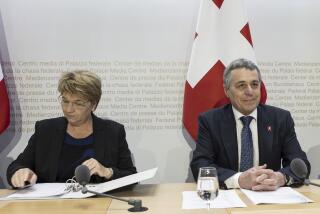Bosnian Wavers on Partition Talks : Balkans: President reportedly says he’ll attend. Then he later apparently rescinds decision to compromise.
- Share via
ZAGREB, Croatia — Bosnian President Alija Izetbegovic reportedly agreed Friday to attend talks here today about an ethnic partitioning of his war-ravaged country after conceding that his people cannot hold out forever between the choices of surrender or death.
European Community mediator Lord Owen said Izetbegovic would convene a session of Bosnia-Herzegovina’s collective presidency “to talk about propositions that are on the table,” a reference to the joint Serb-Croat plan to divide Bosnia into three ethnic mini-states.
However, at a preparatory meeting of the Bosnian leadership in the Bosnian capital, Sarajevo, seven of the 10 presidency members reaffirmed their opposition to any ethnic carve-up, and Izetbegovic reportedly rescinded his decision to compromise. He nominated a staunch opponent of division to come to Zagreb in his place.
“We are for a federation, but not of only three units and not on ethnic principles,” news agencies quoted Izetbegovic as saying. “Therefore the ethnic division of Bosnia-Herzegovina is rejected.”
Owen, dismissing the embattled president’s wavering as “par for the course,” said Izetbegovic had personally assured him that he would be present. The Zagreb talks would in any case proceed, Owen said.
But it appeared questionable that Izetbegovic, under renewed pressure to continue fighting for integration and unity, was poised to capitulate, as Owen broadly hinted.
After Izetbegovic exhibited the first signs of capitulating to growing pressures for surrender, Owen portrayed the Bosnian leader’s new position as an opportunity for negotiated resolution of the savage 15-month-old war that has killed well over 150,000 and driven 2 million Bosnians from their homes.
But Owen also conceded that ethnic partition would represent a moral setback.
“For many people, this solution will have too much ethnicity,” he said, alluding to the massive population shifts likely to become permanent under any ethnically defined carve-up. “But as Izetbegovic pointed out, this is the result of the appalling situation on the ground. As I said, this peace is not made in heaven, but in hell.”
Izetbegovic and other champions of an integrated Bosnia had refused on principle to discuss an ethnic division of the former Yugoslav republic with the Serbian and Croatian nationalist chieftains whose armed factions have already forcibly imposed segregation on much of the ground.
But weary of a losing battle and demoralized by declining foreign concern about the suffering and atrocities inflicted on Bosnian civilians, Izetbegovic appears to be succumbing to mounting pressure to accept the reality that Muslims and other supporters of unity have been defeated by their heavily armed nationalist foes.
“Illusions can’t keep people alive,” the president said in a broadcast address the night before first telling Owen that he would come to Zagreb for the talks.
“We have to say clearly that if there is going to be division, it is going to be an ethnic division, unfortunately,” Izetbegovic said, apparently preparing his people for capitulation. “It is acceptable to us only if we are forced. The other option is war without end, and that is a very ugly option.”
The Bosnian president’s apparent weakening on the defining principle of his predominantly Muslim supporters followed dire warnings by international aid agencies that they can no longer avert mass starvation and disease--and intensifying pressure from Owen and his U.N. counterpart, Thorvald Stoltenberg, for what amounts to a government surrender.
“The alternative to negotiations would be continuous war, intensified war, with more suffering and more people killed,” U.N. special envoy Stoltenberg told reporters in Belgrade after meeting with Serbia’s hard-line president, Slobodan Milosevic, and his nationalist proxy in Bosnia, Radovan Karadzic. Both men have been accused by U.S. officials of complicity in war crimes.
The World Health Organization warned Thursday that aid workers could no longer deliver food, medicine and fuel to the besieged Bosnians and predicted imminent disaster if assaults on civilians continue.
“A catastrophe will take place, the likes of which Europe and the world have not witnessed since the dark days of the Second World War,” the U.N. agency’s director, Hiroshi Nakajima, said in Geneva.
Five other humanitarian aid organizations collectively urged the U.N. Security Council to break the siege of Sarajevo, with force if necessary, because a Bosnian Serb blockade of fuel has shut down generators at hospitals and bakeries and cut off the water supply to most of the encircled city.
Numerous similar appeals by the Sarajevo government on behalf of the civilian victims of the siege have been rejected by the Security Council, which has instead referred the Bosnian crisis to negotiation.
It remained unclear how many of the 10 members of the presidency would attend today’s session, but a spokesman for Owen, David Ludlow, said: “As far as we know, everyone will take part.”
More to Read
Sign up for Essential California
The most important California stories and recommendations in your inbox every morning.
You may occasionally receive promotional content from the Los Angeles Times.











